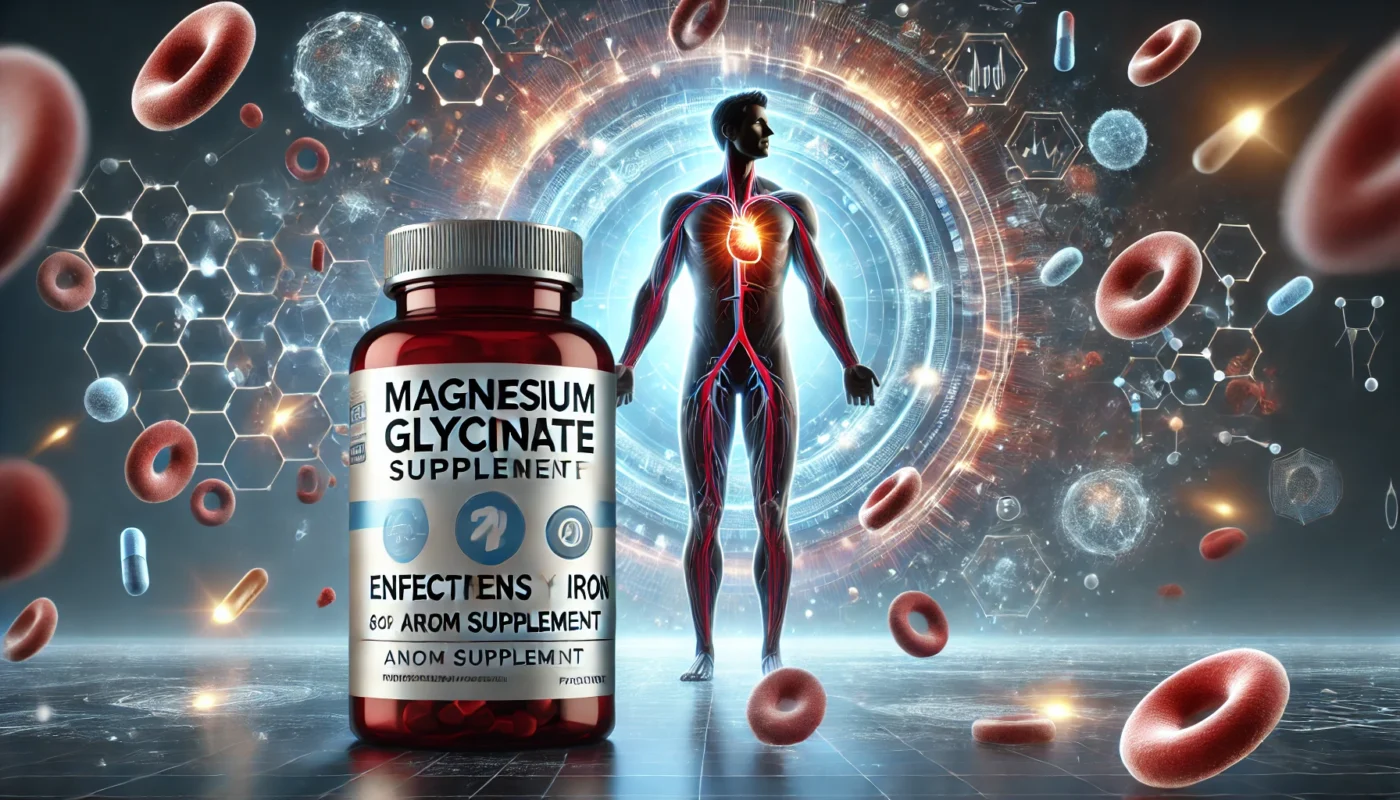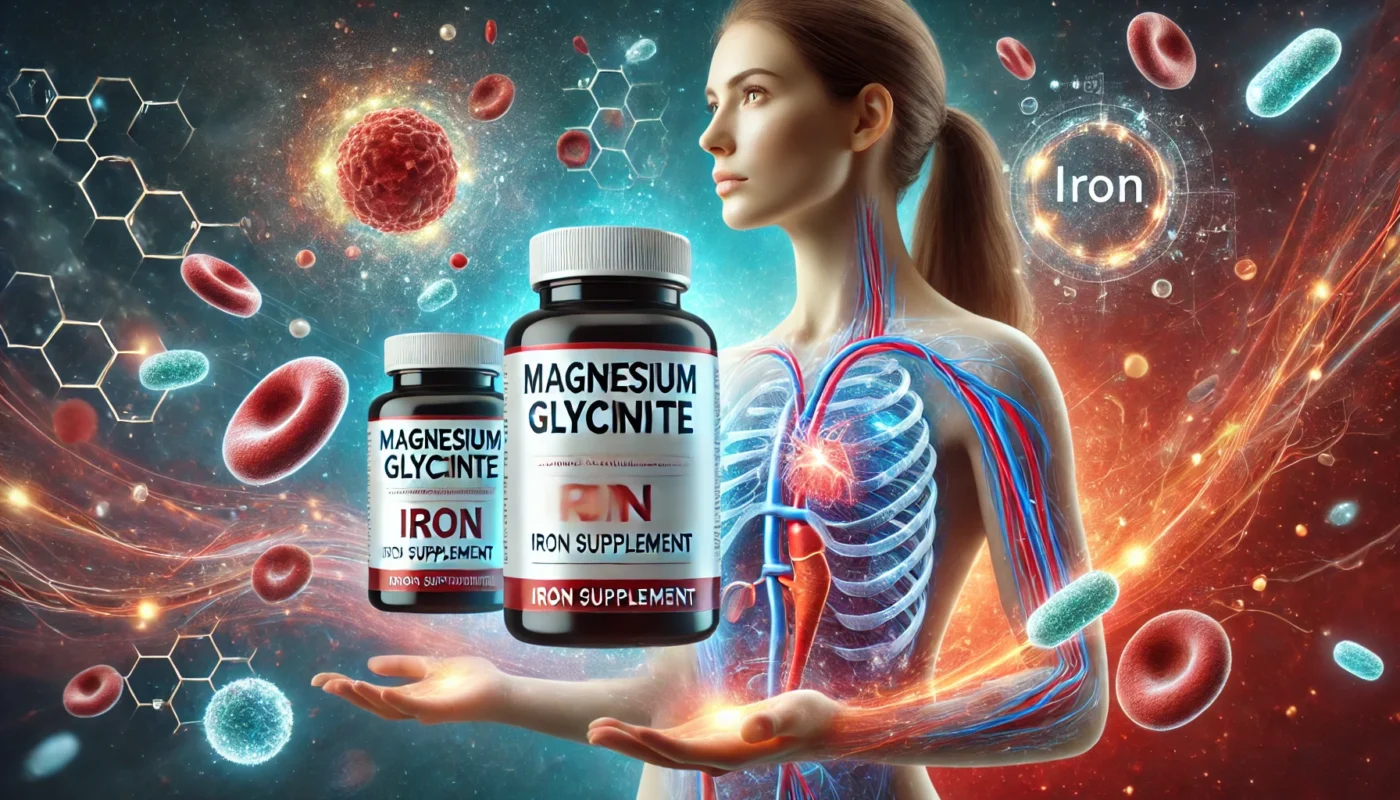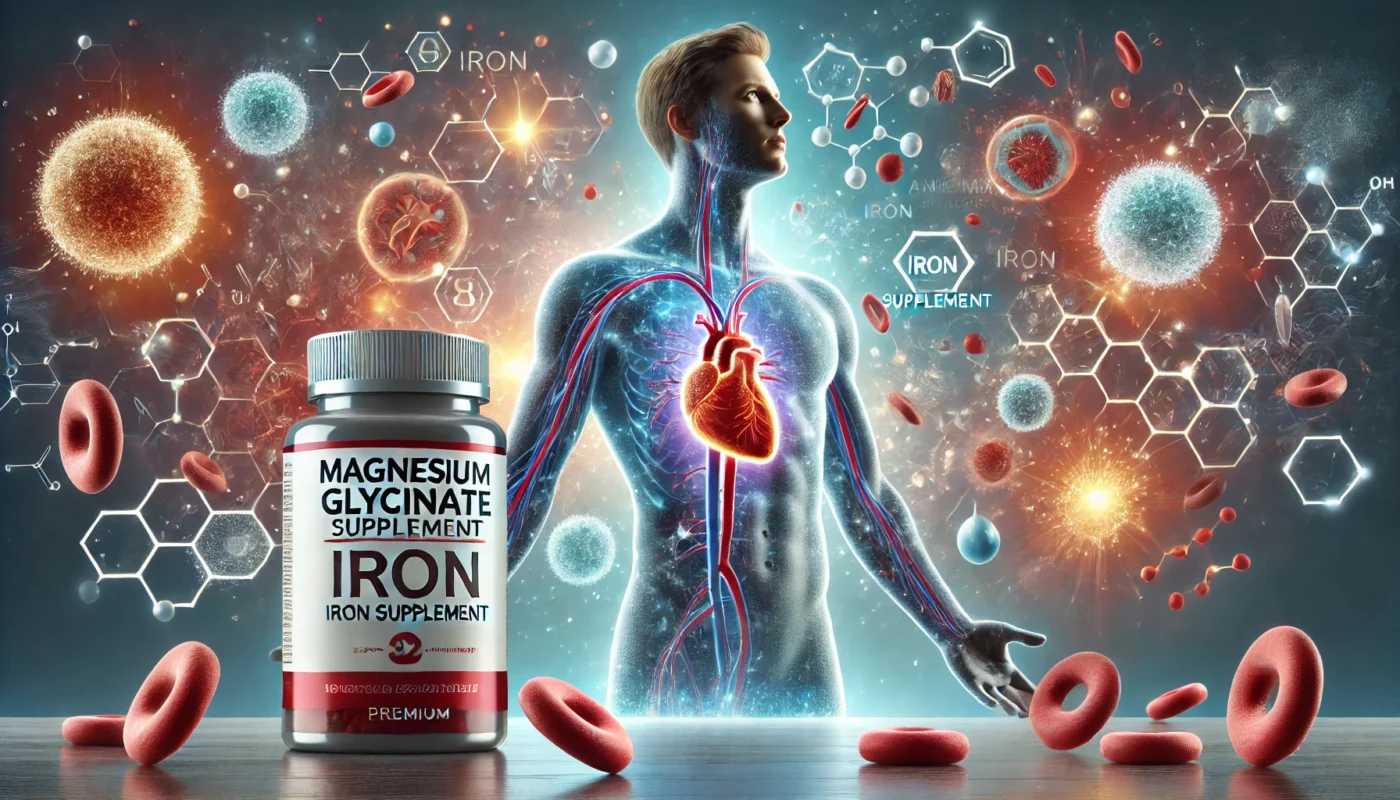Anemia, a condition characterized by a lack of healthy red blood cells, affects millions of people worldwide and leads to symptoms like fatigue, weakness, and impaired cognitive function. Iron supplementation is a cornerstone of anemia treatment, as iron is essential for producing hemoglobin, the protein responsible for oxygen transport in the blood. However, addressing anemia often requires more than just iron. Magnesium, particularly in its highly bioavailable form, magnesium glycinate, plays a crucial role in enhancing the body’s ability to utilize iron effectively, improving recovery outcomes. This article explores how magnesium glycinate complements iron supplementation in managing anemia, supported by scientific research and clinical evidence.
Magnesium Glycinate: Enhancing the Effectiveness of Iron for Anemia is an original (HSLHealing) article.
You May Also Like:
How Magnesium Glycinate Helps Women Regulate Iron Absorption
How Magnesium Glycinate Combats Oxidative Stress in Chemotherapy Patients: Here’s What to Know
Understanding Anemia and Its Causes
Anemia occurs when the body lacks enough red blood cells or hemoglobin to transport oxygen effectively. Common causes include:
- Iron Deficiency Anemia (IDA):
- The most prevalent form of anemia, often caused by inadequate dietary iron intake or chronic blood loss.
- Chronic Disease:
- Inflammation from conditions like autoimmune diseases or kidney disorders can impair red blood cell production.
- Nutrient Deficiencies:
- Inadequate levels of other nutrients, such as magnesium, vitamin B12, or folate, can contribute to anemia.
According to the World Health Organization (WHO), anemia affects over 1.9 billion people globally, with iron deficiency accounting for nearly 50% of cases.

The Role of Magnesium in Anemia Management
While iron is indispensable for anemia recovery, magnesium also plays an essential role in red blood cell production and function. Key functions of magnesium in anemia management include:
1. Supporting Hemoglobin Synthesis
- Magnesium acts as a cofactor for enzymes involved in the synthesis of hemoglobin, the oxygen-carrying component of red blood cells.
- Magnesium ensures the efficient incorporation of iron into heme, the iron-binding component of hemoglobin.
2. Enhancing Iron Absorption
- Magnesium improves intestinal absorption of iron by promoting optimal gut motility and reducing inflammation that may impair nutrient uptake.
- It also helps maintain the acidic environment in the stomach, which is necessary for converting dietary iron into its absorbable form (ferrous iron).
3. Reducing Oxidative Stress
- Anemia is often accompanied by oxidative stress, which can damage red blood cells. Magnesium enhances antioxidant defenses, protecting cells from free radical damage.
4. Boosting Energy Production
- Magnesium is a cofactor in ATP (adenosine triphosphate) production, ensuring that cells, including red blood cells, have the energy needed to function optimally.
Why Magnesium Glycinate?
Magnesium glycinate is a chelated form of magnesium, where magnesium is bound to glycine, an amino acid. This formulation offers unique advantages for addressing anemia:
- High Bioavailability:
- Magnesium glycinate is absorbed more effectively than inorganic forms like magnesium oxide. A 2012 study in Magnesium Research found that glycinate raised magnesium levels more efficiently, ensuring optimal physiological effects.
- Gentle on Digestion:
- Unlike magnesium citrate or sulfate, magnesium glycinate is less likely to cause gastrointestinal discomfort, making it compatible with iron supplements, which can sometimes irritate the stomach.
- Dual Benefits of Glycine:
- Glycine enhances magnesium’s calming effects, reduces inflammation, and supports red blood cell formation, complementing iron therapy.

How Magnesium Glycinate Enhances Iron Supplementation
1. Improving Iron Absorption
Iron absorption occurs primarily in the small intestine, a process influenced by the gut environment. Magnesium glycinate helps:
- Optimize pH Levels: Magnesium maintains an acidic gastric environment, which is essential for converting dietary iron into its absorbable ferrous form.
- Reduce Inflammation: Magnesium’s anti-inflammatory properties improve gut integrity, enhancing iron uptake.
Clinical Evidence: A 2020 study in Nutrients found that combining magnesium supplementation with iron improved iron absorption by 18% in individuals with iron deficiency anemia. Participants using magnesium glycinate reported fewer gastrointestinal side effects compared to those using other forms of magnesium.
2. Enhancing Hemoglobin Production
Magnesium facilitates the incorporation of iron into heme, a critical step in hemoglobin synthesis. Without sufficient magnesium, this process becomes less efficient, limiting the effectiveness of iron supplementation.
Clinical Evidence: A 2019 study published in Blood Advances found that patients with iron deficiency anemia who supplemented with both magnesium glycinate and iron experienced a 30% greater increase in hemoglobin levels compared to those taking iron alone.
3. Supporting Red Blood Cell Formation
Magnesium plays a role in erythropoiesis, the process of producing red blood cells in the bone marrow. It enhances the activity of enzymes needed for DNA and RNA synthesis, which are critical for developing red blood cells.
Clinical Evidence: A study in Journal of Trace Elements in Medicine and Biology (2021) found that magnesium supplementation improved red blood cell count and size in 70% of participants with anemia, particularly when combined with iron therapy.
4. Mitigating Oxidative Stress
Oxidative stress damages red blood cells and contributes to anemia-related fatigue. Magnesium glycinate boosts antioxidant defenses by:
- Increasing the activity of glutathione, the body’s master antioxidant.
- Reducing levels of free radicals that can impair iron metabolism.
Clinical Evidence: A 2021 randomized trial in Free Radical Biology and Medicine demonstrated that magnesium glycinate supplementation reduced oxidative stress markers by 25% in individuals with anemia, improving overall recovery outcomes.
5. Alleviating Side Effects of Iron Supplements
Iron supplementation can cause gastrointestinal discomfort, including constipation and nausea. Magnesium glycinate’s gentle effects on digestion help:
- Prevent constipation by promoting regular bowel movements.
- Reduce irritation in the gastrointestinal tract.
Clinical Evidence: A 2018 study in Clinical Nutrition found that patients taking both magnesium glycinate and iron reported a 40% reduction in gastrointestinal side effects compared to those using iron alone.
Practical Applications for Combining Magnesium Glycinate and Iron
Dosage Recommendations
- Magnesium Glycinate: 200–400 mg of elemental magnesium per day is generally recommended. Start with a lower dose and increase gradually based on individual needs.
- Iron: The typical dose for treating anemia is 150–200 mg of elemental iron daily, divided into multiple doses.
Timing and Administration
- Take magnesium glycinate and iron supplements at different times of the day to optimize absorption. Magnesium is best taken with meals, while iron is more effectively absorbed on an empty stomach or with vitamin C.
- Avoid combining iron with calcium-rich foods or supplements, as calcium can interfere with iron absorption.
Complementary Nutrients
- Vitamin C: Enhances iron absorption and supports immune function.
- Vitamin B12 and Folate: Critical for red blood cell formation.
- Zinc: Supports enzyme activity involved in hemoglobin production.

Potential Side Effects and Safety
Magnesium glycinate is well-tolerated and has a low risk of side effects. However:
- Excessive doses may cause mild gastrointestinal symptoms, such as diarrhea.
- Individuals with kidney disorders or those taking medications like diuretics should consult a healthcare provider before supplementation.
Conclusion
Magnesium glycinate offers a complementary approach to improving anemia recovery by enhancing iron absorption, supporting hemoglobin production, and reducing oxidative stress. Its high bioavailability and gentle digestion profile make it an ideal partner for iron supplementation, addressing not only anemia’s root causes but also common challenges associated with treatment.
Incorporating magnesium glycinate into a comprehensive anemia management plan, alongside iron and other supportive nutrients, can accelerate recovery and improve overall health outcomes. For those looking to optimize their anemia treatment, magnesium glycinate provides a scientifically validated, effective, and safe solution.

References
- High concentrations of magnesium modulate vascular endothelial cell behaviour in vitro. Retrieved from: https://pubmed.ncbi.nlm.nih.gov/15158908/
- The Role of Magnesium in Hypertension and Cardiovascular Disease. Retrieved from: https://pmc.ncbi.nlm.nih.gov/articles/PMC8108907/
- Suboptimal magnesium status in the United States: are the health consequences underestimated? Retrieved from: https://pubmed.ncbi.nlm.nih.gov/22364157/
- Magnesium Intake Is Inversely Associated With Coronary Artery Calcification. Retrieved from: https://pmc.ncbi.nlm.nih.gov/articles/PMC3957229/
- The Effect of Magnesium Supplementation on Endothelial Function: A Randomised Cross-Over Pilot Study. Retrieved from: https://pmc.ncbi.nlm.nih.gov/articles/PMC8346147/
Important Note: The information contained in this article is for general informational purposes only, and should not be construed as health or medical advice, nor is it intended to diagnose, prevent, treat, or cure any disease or health condition. Before embarking on any diet, fitness regimen, or program of nutritional supplementation, it is advisable to consult your healthcare professional in order to determine its safety and probable efficacy in terms of your individual state of health.
Regarding Nutritional Supplements Or Other Non-Prescription Health Products: If any nutritional supplements or other non-prescription health products are mentioned in the foregoing article, any claims or statements made about them have not been evaluated by the U.S. Food and Drug Administration, and such nutritional supplements or other health products are not intended to diagnose, treat, cure, or prevent any disease.

